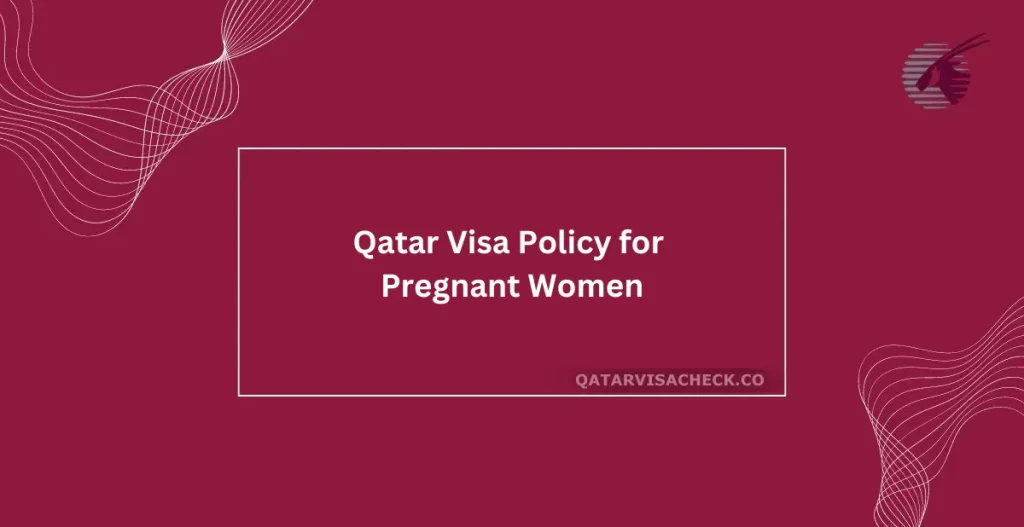Are you wondering if traveling to Qatar while pregnant is possible? Navigating visa policies can feel overwhelming, especially when expecting. Let’s explore Qatar’s 2025 visa regulations for pregnant travelers, addressing key concerns like documentation, healthcare requirements, and travel restrictions to ensure a smooth and stress-free journey.
What is Qatar Visa Policy for Pregnant Ladies in 2025? (Quick Answer)
Qatar’s 2025 visa policy for pregnant women involves:
- Valid passport and visa.
- Medical clearance for travel.
- Comprehensive insurance.
- Awareness of airline restrictions.
- Understanding local maternity laws.
Follow these steps for a smooth, safe trip to Qatar during pregnancy.
Qatar Visa Policy for Pregnant Ladies in 2025
1. General Visa Requirements for Visitors
Qatar’s visa policy for tourists and residents remains welcoming in 2025, but pregnant travelers need to meet specific requirements:
- Valid Passport: Ensure it’s valid for at least six months beyond your travel date.
- Visa Type: Depending on your nationality, a tourist visa, visa on arrival, or an electronic visa (eVisa) may be necessary.
- Return Ticket: Proof of onward or return travel is mandatory for entry.
2. Medical Documentation Requirements
For pregnant travelers, medical documentation plays a crucial role in obtaining a visa:
- Medical Clearance Letter: Issued by a certified doctor confirming fitness for travel, typically required after the second trimester.
- Prenatal Records: Carry a summary of prenatal checkups to show the pregnancy’s progress and any health concerns.
- Travel Insurance: Comprehensive insurance that covers pregnancy-related emergencies is recommended.
3. Healthcare Access in Qatar
Qatar offers state-of-the-art medical facilities, and pregnant visitors can access high-quality healthcare services:
- Public Hospitals: Hamad Medical Corporation (HMC) offers maternity services but may prioritize residents.
- Private Clinics: More accessible for short-term visitors, with faster services but at higher costs.
- Prenatal Care: Available through various clinics; however, non-residents may need to pay out of pocket.
4. Travel Restrictions for Pregnant Women
While Qatar does not impose direct bans on pregnant travelers, airlines may have their own restrictions:
- Airline Guidelines: Most airlines restrict travel after 36 weeks of pregnancy without a doctor’s approval.
- Fit-to-Fly Certificate: Some airlines may require this certificate from 28 weeks onwards.
- Medical Emergencies: Travelers in late pregnancy should be aware of emergency protocols upon arrival in Qatar.
5. Legal Considerations for Pregnant Visitors
Qatar follows strict legal policies that pregnant visitors must be aware of:
- Maternity Laws: Pregnant women giving birth in Qatar must follow local regulations, particularly concerning unmarried pregnancies.
- Birth Registration: A birth certificate requires documentation from both parents and the hospital.
- Parental Rights: Guardianship laws may differ for non-residents, and it’s advisable to consult legal experts if planning a long stay.
6. Cultural Sensitivities
Understanding Qatari culture is vital:
- Modesty Standards: Dress modestly, especially in healthcare settings.
- Respect for Customs: Engage respectfully with local customs regarding family and maternity care.
- Communication: Arabic is the official language, but English is widely spoken in hospitals.
FAQs about Qatar Visa Policy for Pregnant Ladies in 2025
1. Do pregnant women need a special visa to enter Qatar?
No, pregnant women do not require a special visa. However, they must meet the standard entry requirements, including a valid passport, visa, and medical clearance if needed by airlines.
2. Is medical insurance mandatory for pregnant travelers?
While medical insurance is not legally required for entry, it is highly recommended. Comprehensive travel insurance covering pregnancy-related emergencies ensures peace of mind during your stay.
3. Can pregnant tourists access public hospitals in Qatar?
Yes, pregnant tourists can access public hospitals, but non-residents may have limited access or longer waiting times. Private clinics are more accessible for visitors, though more expensive.
4. Are there any travel restrictions for pregnant women entering Qatar?
Qatar does not have specific restrictions for pregnant women. However, airlines may require a fit-to-fly certificate after 28 weeks of pregnancy and may restrict travel after 36 weeks.
5. What happens if a baby is born in Qatar to non-resident parents?
Babies born to non-resident parents must be registered with the local authorities. A birth certificate is issued based on the hospital’s records and parental documentation, including passports and marriage certificates.
Conclusion
Traveling to Qatar while pregnant in 2025 is possible with the right preparation. By meeting visa requirements, securing medical documents, and understanding cultural and legal expectations, pregnant women can enjoy a safe and comfortable visit to Qatar.

Hey there, I’m Hamza Al-Abdullah, the brains and heart behind Qatarvisacheck.qa. Proudly rooted in the bustling city of Doha, Qatar, I’ve made it my mission to untangle the visa web for fellow travelers. My website isn’t just a hub for visa info; it’s a personalized journey through the often confusing world of travel documents.







